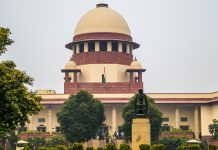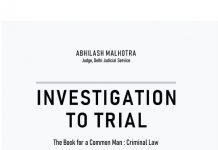Do an errant Police official who misuses his authority or intentionally omits to exercise it go scot-free? What deters the erring Police officials who disobey the law and fail to register F.I.R.? What is the legal recourse available?
The law makers being conscious of the situation have made the disobedience of law by public servants a punishable offence under section 166 IPC. When a public servant, knowingly disobeys a direction of the law thereby causing injury to any person due to such disobedience, thereby commits an offence punishable with simple imprisonment for a term which may extend to one year, or with fine, or with both. (P. Vasanth Kumar vs The Commissioner of Police, 2007 Crlj 2013.)
In respect of offences against women, Sec. 166A of IPC, stipulates that if a public servant fails to record any information given to him under Sec. 154(1) CrPC in relation to cognizable offences punishable under sections 326-A, 326-B, 354, 354-B, 370, 370-A, 376, 376-A, 376-B, 376-C, 376-D, 376-E or S. 509, he shall be punished with rigorous imprisonment for a term which shall not be less than six months but may extend to two years and shall also be liable to fine.
The intent of the legislature in putting forth this amendment was to tighten the already existing provisions and to provide enhanced safeguards to the women under distress. The legislature, after noticing the increasing crime against women, thought it appropriate to expressly punish the police officers for their failure to register F.I.R. in these cases. (Lalita Kumari vs Govt. of U.P., (2007) SCC Online AP 82)
The registration of F.I.R. is only a trigger point in the Criminal Justice System, and not the feat accomplished. Investigation lays down the foundation stone of Trial. The prosecution is supposed to discharge its burden by proving the case beyond reasonable doubt against the accused. Therefore, the duty to collect the best evidence lies on the shoulder of the investigating officer. In case the investigating officer does inefficiently conducts the investigation or internationally overlooks the important evidence during the investigation the same is going waken the case of the prosecution and will benefit the accused. An investigation officer, who intentionally overlooks the essential evidence which resultantly scuttles the Trial, needs to be made accountable for his lapses.
Dealing with this issue, the Hon’ble Supreme Court of India in State of Gujarat vs. Kishanbhai ((2014) 5 SCC 108) held that:
“22. Every acquittal should be understood as a failure of the justice delivery system, in serving the cause of justice. Likewise, every acquittal should ordinarily lead to the inference, that an innocent person was wrongfully prosecuted. It is therefore essential that every State should put in place a procedural mechanism which would ensure that the cause of justice is served, which would simultaneously ensure the safeguard of interest of those who are innocent. In furtherance of the above purpose, it is considered essential to direct the Home Department of every State to examine all orders of acquittal and to record reasons for the failure of each prosecution case. A Standing Committee of senior officers of the police and prosecution departments should be vested with the aforesaid responsibility. The consideration at the hands of the above Committee, should be utilised for crystallising mistakes committed during investigation, and/or prosecution, or both. The Home Department of every State Government will incorporate in its existing training programmes for junior investigation/prosecution officials course-content drawn from the above consideration. The same should also constitute course-content of refresher training programmes for senior investigating/prosecuting officials. The above responsibility for preparing training programmes for officials should be vested in the same Committee of senior officers referred to above. Judgments like the one in hand (depicting more than ten glaring lapses in the investigation/prosecution of the case), and similar other judgments, may also be added to the training programmes. The course-content will be reviewed by the above Committee annually, on the basis of fresh inputs, including emerging scientific tools of investigation, judgments of Courts, and on the basis of experiences gained by the Standing Committee while examining failures, in unsuccessful prosecution of cases. We further direct, that the above training programme be put in place within 6 months. This would ensure that those persons who handle sensitive matters concerning investigation/prosecution are fully trained to handle the same. Thereupon, if any lapses are committed by them, they would not be able to feign innocence when they are made liable to suffer departmental action for their lapses.
23. On the culmination of a criminal case in acquittal, the investigating/prosecuting official(s) concerned responsible for such acquittal must necessarily be identified. A finding needs to be recorded in each case, whether the lapse was innocent or blameworthy. Each erring officer must suffer the consequences of his lapse, by appropriate departmental action, whenever called for. Taking into consideration the seriousness of the matter, the official concerned may be withdrawn from investigative responsibilities, permanently or temporarily, depending purely on his culpability. We also feel compelled to require the adoption of some indispensable measures, which may reduce the malady suffered by parties on both sides of criminal litigation. Accordingly, we direct the Home Department of every State Government to formulate a procedure for taking action against all erring investigating/prosecuting officials/officers. All such erring officials/officers identified, as responsible for failure of a prosecution case, on account of sheer negligence or because of culpable lapses, must suffer departmental action. The above mechanism formulated would infuse seriousness in the performance of investigating and prosecuting duties, and would ensure that investigation and prosecution are purposeful and decisive. The instant direction shall also be given effect to within 6 months.”
From the aforesaid mandate given by the Hon’ble Supreme Court, it is clear that the emphasis is to train the police officials and to learn from the lapses. On the other hand, it is also stressed to make the erring officials accountable by initiating department action against them. The objective is to have a competent police force with professional investigative skills. The responsibility of investigation may also be withdrawn from the officials temporarily or permanently depending upon the gravity of allegations.















